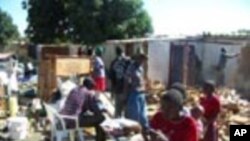Thousands of Zimbabwean children displaced with their families six years ago by the forced eviction and demolition program known as Operation Murambatsvina have been deprived of education as a result, Amnesty International said Wednesday.
The human rights watchdog organization has called on Zimbabwean authorities to ensure that children displaced by the operation receive an education.
Amnesty said thousands of children in Harare-area settlements like Hatcliffe Extension and Hopley Farm have gone without any proper schooling, some as a result drifting into the sex trade seeking a way to contribute to their family’s livelihood.
A United Nations investigation conducted after Operation Murambatsvina, which in the majority Shona language means "Drive Out the Filth," said some 700,000 people lost their homes or their livelihoods or both in the mass eviction and demolition spree.
Observers believe the exercise was conducted by the government of President Robert Mugabe to disperse urban populations supporting the opposition Movement for Democratic Change of now-Prime Minister Morgan Tsvangirai.
Amnesty said some schools were also demolished in 2005.
Amnesty researcher Simeon Mawanza told a news conference in Harare Wednesday that many children still are not receiving a good education for lack of proper schools at Hopley Farm. Some children attend makeshift schools without qualified staff.
Reverend Useni Sibanda, director of the Christian Alliance which was active in 2005 in assisting the victims of Operation Murambatsvina, told VOA reporter Ntungamili Nkomo that the government should respond to amnesty’s recommendations and provide housing and educational facilities for children whose lives were disrupted.
Education Minister David Coltart called the Amnesty report "credible,” but said that his ministry does not have programs specifically targeting child victims of Murambatsvina.
Coltart said most Zimbabwean children were affected by deterioration of education in the last decade, so his ministry is trying to help poor children across the board. He said great strides have been made addressing the issues raised by Amnesty.
Deputy Minister of Local Government and Urban Development Cesil Zvidzai said the cash-strapped government is facing a challenge addressing the sad conditions at Hopley Farm and similar settlements where those displaced by Murambatsvina ended up.
He said efforts are underway to build more affordable housing for poor Zimbabweans.
Elsewhere in education, teachers on Wednesday bemoaned the proliferation of backyard schools which are not regulated by the government and which, according to teachers unions, do not respect labor laws. The complaint emerged at observations in Bulawayo of World Teachers Day staged by the Progressive Teachers Union of Zimbabwe.
Union members expressed concern at the persistence of political violence, calling for the depoliticization of schools and curricula, and drawing attention to still-low teacher pay.
Progressive Teachers Union Bulawayo Official Vusumuzi Mahlangu told VOA reporter Chris Gande that teacher incentives - informal payments by parents - are a focus too as teachers want to see their official salaries raised over $500 a month in January.
In Harare, teachers unions told Parliament's committee on education that wide reforms are needed in the sector to address the issue of interference in school matters.
Teacher representatives say politics has become a constant presence, leading to tension between school administrators and staff and partisan political leaders.
Zimbabwe Teachers Association Executive Officer, Sifiso Ndlovu, who took part in the discussion in Parliament, said the intrusion of politics into the school system is undermining education, so the government must draw clearer lines.
Education MInister Coltart on a number of occasions has urged that politics be kept out of schools, but has said specific legislation to this purpose is needed.





